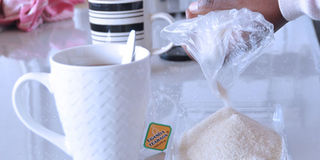Government rushes to control sugar exports

Government fears that the sugar crisis in Kenya might result into a shortage in Uganda if exports are not controlled. PHOTO BY ERONIE KAMUKAMA
What you need to know:
- Uganda currently produces more than 430,000 tonnes against a demand of about 350,000tonnes.
- According to Mr Kirunda Magoola, the Kinyara Sugar Limited corporate communications manager, Kenya can take the surplus and this will not affect the local market.
Kampala. By Friday this week, government would have decided on whether to limit sugar exports or ban them altogether in order to protect the local market from shortage.
The move follows a sugar shortages in Kenya that has seen local traders rush to exploit the crisis across the border.
Government now fears if the exports to Kenya remain unrestrained, it could trigger a rise in prices of sugar in Uganda.
“We are going to ensure that it is controlled because earlier on we had agreed that we export only 25,000 metric tonnes a year and now they have gone beyond that. So we have to stop this and ensure that they do not export much,” Mr David Kiiza, the senior industry officer at the Ministry of Trade, said yesterday in a phone interview.
Ministry of Trade will today meet with Uganda Revenue Authority (URA) to guide on the current sugar exports.
“Based on that stock, we will agree on whether to allow them to export or not. If there is more than enough, we shall allow them but we shall not allow more than 10,000 tonnes I think. If there is insufficient stock, we shall work with URA to stop the exports,” Mr Kiiza said.
URA manager for Eastern Uganda James Malinzi said in a report by NTV that sugar exports through Busia border in the last three weeks hit 75 metric tonnes, from 50 tonnes last month.
The high demand for Ugandan sugar is a result of low production from Kenyan manufacturers and a recent crackdown on illegal sugar that saw more than 500,000 tonnes confiscated in the past weeks.
Consequentially, Kenyans are buying a kilogramme of sugar at an equivalent of Shs7,000, twice the price of the same quantity in Uganda.
According to Mr Wilberforce Mubiru, the general secretary Uganda Sugar Manufacturers Association, local producers can sustainably produce for both markets but the local market remains a priority.
“We have been exporting. We exported 30,900 metric tonnes in 2017 and 66,000 in 2016. If the sugar that is produced in Uganda is what traders are exporting, it could bring a shortage but if it is re-exported sugar then that is okay is,” he said.
Slumping sugar production in Uganda is a result of strict licensing of sugar factories without sources of raw materials but the Uganda sugar industry continues to produce at a surplus and can ably satisfy the domestic and regional market without destabilising retail prices, Mr Kirunda Magoola, corporate communications manager Kinyara Sugar Limited said.
Uganda currently produces more than 430,000 tonnes against a demand of about 350,000tonnes.
The worry
According to Mr Kirunda Magoola, the Kinyara Sugar Limited corporate communications manager, Kenya can take the surplus and this will not affect the local market.
However, the industry, he says, is only worried of unregulated imports, which is threatening the local market.
Additionally, the high cost of raw materials continues to affect the value chain, an aspect which is more likely to affect sugar prices, according to Mr Magoola.
“In the financial year 2016/17, we paid Shs118b (in taxes). This financial year 2017/18, we barely made Shs40b by December 2017. We are going to pay far less than we did due to poor regulation,” he said.




